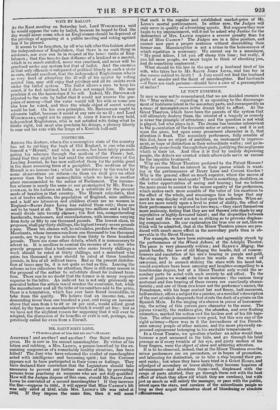NOSTRUMS.
AMONG the doctors, whom the consumptive state of the country has set to rubbing the back of Old England, is one who calls himself a " Hermit," and who, it seems, has been lately promul- o bnline. his schemes through the medium of the Times; but, afraid that they might be lost amid the multifarious stores of the Leading Journal, he has now collected them for the public good in the more assuming form of a pamphlet. The nostrum of the Hermit is an income-tax; which he introduces to the reader by some observations on reform—to them we shall give no other answer than the brief monosyllable which we have in another place recommended to the notice of Parliament. The income- tax scheme is nearly the same as one promulgated by Mr. Bucx- INGHAM, in his lectures on India, as a substitute for the present mode of taxation in that country. The Hermit calculates, that out of twelve millions, the population of England, nine millions and a half are labourers and children (there are no women in England—SAINT JOHN LONG has rubbed them out) ; these are not to be taxed at all. The remaining two millions and a half he would divide into twerrtyeelisses ; the first ten, comprehending handicrafts, tradesmen, and manufacturers, with incomes varying from forty or fifty to one thousand pounds. The lowest class, he proposes, shall pay thirty shillings, the highest twenty-seven pounds a year. These ten classes will, he calculates, produce five millions. Merchants, whose incomes run from one thousand to ten thousand pounds, are to pay by the scheme from thirty to three hundred pounds. There are some other details, which it is unnecessary to advert to. It is needless to combat the reveries of a writer who gravely proposes that a tradesman who earns twenty shillings a week should be rated at thirty shillings, and a merchant who gains ten thousand a year should be rated at three hundred pounds, in lieu of all indirect taxes. Bad as the present distribu- tion of taxes may be, it is not quite so bad as this. Leaving the scheme as too ridiculous for attention, there is still some reason in the proposal of the author to substitute direct for indirect taxa- tion. There can be no doubt that the former is in many respects superior to the latter. An indirect tax is not only grievously ag- gravated before the article taxed reaches the consumer, but, while the manufacturer and all the tribe of transmitters add to the price, there is a temptation, which has ever been found irresistible, to take from the quality. We believe that an income-tax„ not descending lower than one hundred a year, and rising on incomes above that sum from 5 to 40 or 50 per cent., would afford great relief, by the taxes on manufacture which it would set free : but as we have not the slightest reason for supposing that it will ever be adopted, the discussion of its benefits or evils is not, perhaps, im- peratively called for even from a Hermit.


























 Previous page
Previous page